
Back Zemské volby ve Šlesvicku-Holštýnsku 2017 Czech Landtagswahl in Schleswig-Holstein 2017 German Κρατιδιακές εκλογές του Σλέσβιχ-Χόλσταϊν (2017) Greek Elecciones estatales de Schleswig-Holstein de 2017 Spanish Élections régionales de 2017 en Schleswig-Holstein French Lundaiswool uun Sleeswich-Holstian 2017 FRR Valget i Schleswig-Holstein 2017 NB Wybory regionalne w Szlezwiku-Holsztynie w 2017 roku Polish Выборы в ландтаг Шлезвиг-Гольштейна (2017) Russian 第19屆舒勒斯維-荷斯泰因州議會選舉 ZH-YUE
| ||||||||||||||||||||||||||||||||||||||||||||||||||||||||||||||||||||||||||||||||||||||||||||||||||||||||||||
All 73 seats in the Landtag of Schleswig-Holstein 37 seats needed for a majority | ||||||||||||||||||||||||||||||||||||||||||||||||||||||||||||||||||||||||||||||||||||||||||||||||||||||||||||
|---|---|---|---|---|---|---|---|---|---|---|---|---|---|---|---|---|---|---|---|---|---|---|---|---|---|---|---|---|---|---|---|---|---|---|---|---|---|---|---|---|---|---|---|---|---|---|---|---|---|---|---|---|---|---|---|---|---|---|---|---|---|---|---|---|---|---|---|---|---|---|---|---|---|---|---|---|---|---|---|---|---|---|---|---|---|---|---|---|---|---|---|---|---|---|---|---|---|---|---|---|---|---|---|---|---|---|---|---|
| Turnout | 1,474,508 (64.2%) | |||||||||||||||||||||||||||||||||||||||||||||||||||||||||||||||||||||||||||||||||||||||||||||||||||||||||||
| ||||||||||||||||||||||||||||||||||||||||||||||||||||||||||||||||||||||||||||||||||||||||||||||||||||||||||||
 Results for the single-member constituencies | ||||||||||||||||||||||||||||||||||||||||||||||||||||||||||||||||||||||||||||||||||||||||||||||||||||||||||||
| ||||||||||||||||||||||||||||||||||||||||||||||||||||||||||||||||||||||||||||||||||||||||||||||||||||||||||||
The 2017 Schleswig-Holstein state election was held on 7 May 2017 to elect the members of the Landtag of Schleswig-Holstein. The incumbent government was led by Minister-President Torsten Albig, and consisted of the Social Democratic Party (SPD), The Greens, and the South Schleswig Voters' Association (SSW). The government lost its majority in the election.
The result was a stalemate, with the incumbent left-wing government parties (SPD, Greens and SSW) being three seats short of a majority, and CDU and its usual coalition partner FDP also coming up three seats short due to the right-wing populist party Alternative for Germany (AfD) entering the Landtag. With no party willing to go into coalition with them, it necessitated cross-aisle cooperation.
FDP leader Wolfgang Kubicki ruled out a traffic light coalition (SPD-Greens-FDP),[1] whilst CDU leader Daniel Günther ruled out a Grand coalition (CDU-SPD).[2] The Christian Democratic Union (CDU) subsequently formed a Jamaica coalition with the Free Democratic Party (FDP) and Greens. Günther was elected Minister-President by the Landtag, and Günther cabinet was sworn into office.
- ^ Höver, Peter (2017-05-16). "Bereitschaft der FDP zu Ampelkoalition ist "vollständig erschöpft"". shz.de (in German). Retrieved 2023-11-28.
- ^ "Schleswig-Holstein-Sieger schliesst grosse Koalition so gut wie aus". SWI swissinfo.ch (in German). 2017-05-08. Retrieved 2023-11-28.
© MMXXIII Rich X Search. We shall prevail. All rights reserved. Rich X Search






